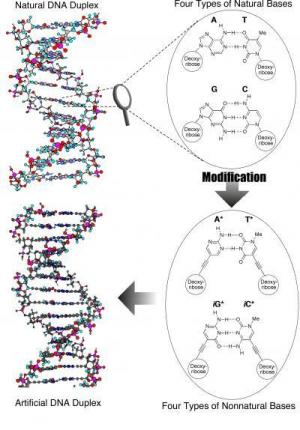The finding could lead to improvements in gene therapy, the development of futuristic nanocomputers and other knowledge-intensive developments, the researchers claim

Chemists in Japan report the development of the world's first DNA compound that consists almost entirely of artificial ingredients. The finding could lead to improvements in gene therapy, the development of futuristic nanocomputers and other knowledge-intensive developments, the researchers claim.
In the new study, researcher Masahiko Inouye and his colleagues point out that scientists have been trying for many years to develop artificial versions of DNA in order to expand its spectacular information storage capabilities. As the genetic blueprint of all life forms known to us, DNA uses the same system of four basic building blocks, known as "bases" (bases) to encode a variety of proteins used in cell construction, function and development.
To date, scientists have been able to synthesize DNA compounds with only one or two artificial components, including certain bases. The researchers used advanced DNA synthesis equipment to connect four completely new artificial bases that make up the sugar-based part of the DNA backbone. The result was a natural DNA-like double helix structure with unusual stability. Like natural DNA, the new structure had a preference for right-handed chirality and some produced triple-stranded structures. The unique chemistry of these structures and their high stability offer unprecedented possibilities for the development of new biotechnological materials and surprising applications, say the researchers.

11 תגובות
Why don't you show what artificial ingredients are?
Definetly agree.
Roy:
To be honest, their use of the word DNA bothers me
It only creates ambiguity.
If they had at least used the phrase "DNA-like" they would have dispelled some of the fog.
In Craig Venture's project, I think they produce completely normal DNA but in a completely synthetic way. There the use of the word DNA is completely legitimate but in the current context it is simply misleading.
reagent,
It is very likely that the artificial DNA exists in optimal conditions different from those of normal DNA, such as acidity, salinity and so on.
Based on everything we know about the specificity of enzymes, it is very likely that the vast majority of enzymes that work on natural DNA will not work on artificial DNA.
Because the building blocks are different, then there is a serious change..
Does this mean that the treatment of artificial DNA is required to be different from the treatment of natural DNA?
And some of the enzymes that work on natural DNA will not work on artificial DNA?
Ahh!
It was really hidden from me in the first reading.
The original article really talks about 4 new and original buildings, meaning no ATGC. If so, definitely interesting news.
ZA news that might become interesting if we find the right apps to use.
Greetings friends,
Ami Bachar
Ami,
DNA is a substance with many functions. It can be used as an excellent molecular glue, structures can be created from it, and of course information can also be stored on it. The researchers here succeeded in showing that it is possible to create a substance that mimics the properties of DNA, even though it is made of different building blocks.
I would say that more than anything else, there is the possibility of new engineering capabilities here. And who knows - if aliens ever come to Earth, we may yet discover that the technical information from this experiment can explain what their DNA is made of.
Ami:
You synthesize DNA from organic ingredients.
Here it is a perfect synthesis without relying on organic ingredients.
In the project I pointed to, they intend to create an entire bacterium (initially only an entire genome of a bacterium) synthetically.
I suppose that one of the goals of this project is in the more philosophical area - to prove that it is possible to create life without being based on life.
There is also a desire to achieve complete control over the results of DNA creation - that is - to create DNA according to design and not as a copy of existing DNA.
I can't really guess what can be done with such a thing. I synthesize DNA several times a day and it's the easiest thing to do with the most basic PCR device available. A cheap device, cheap materials, you can produce any coil you want. What's the story? The previous one. Why synthesize DNA from scratch? Everything is already ready for us. Easy simply available and cheap.
I would love to hear from the talkbackists about possible applications in this matter.
Thanks in advance,
Ami Bachar
I don't think this is the first success:
http://en.wikipedia.org/wiki/Mycoplasma_laboratorium
A very interesting article, it's just a shame it was short. In the above case I would be happy to read a little more detailed information...
Hanan Sabat
http://WWW.EURA.ORG.IL